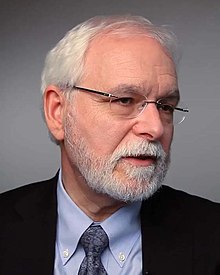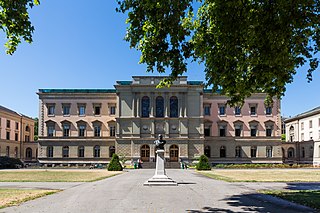
The University of Geneva is a public research university located in Geneva, Switzerland. It was founded in 1559 by John Calvin as a theological seminary. It remained focused on theology until the 17th century, when it became a center for enlightenment scholarship. Today, it is the third largest university in Switzerland by number of students.

Ernesto Silvio Maurizio Bertarelli is an Italian-born Swiss billionaire businessman and philanthropist.

Cyberkinetics is an American company with roots tied to the University of Utah. It was co-founded by John Donoghue, Mijail Serruya, Gerhard Friehs of Brown University, and Nicho Hatsopoulos of the University of Chicago. The Braingate technology and related Cyberkinetic’s assets were sold to Blackrock Neurotech and BrainGate Inc. in 2008.
Articles related specifically to biomedical engineering include:
Bin He is a Chinese American biomedical engineering scientist. He was the Trustee Professor and Head of the Department of Biomedical Engineering, and Professor by courtesy in the Department of Electrical and Computer Engineering, and Professor of the Neuroscience Institute at Carnegie Mellon University. Prior, he was Distinguished McKnight University Professor of Biomedical Engineering and Medtronic-Bakken Endowed Chair for Engineering in Medicine at the University of Minnesota. He previously served as the director of the Institute for Engineering in Medicine and the Center for Neuroengineering at the University of Minnesota. He is the Editor in Chief of the IEEE Transactions on Biomedical Engineering. He was the president of the IEEE Engineering in Medicine & Biology Society (EMBS) from 2009 to 2010.
Neurosecurity has been defined as "a version of computer science security principles and methods applied to neural engineering", or more fully, as "the protection of the confidentiality, integrity, and availability of neural devices from malicious parties with the goal of preserving the safety of a person’s neural mechanisms, neural computation, and free will". Simply put, Neurosecurity is, at least in principle, an antivirus and firewall for the mind. Neurosecurity also refers to the application of neuroscience to behavioral information security to better understand and improve users' security behaviors. Neurosecurity is a distinct concept from neuroethics; neurosecurity is effectively a way of enforcing a set of neuroethical principles for a neural device. Neurosecurity is also distinct from the application of neuroscience to national security, a topic that is addressed in Mind Wars: Brain Research and National Defense by Jonathan D. Moreno.

Edward S. Boyden is an American neuroscientist at MIT. He is the Y. Eva Tan Professor in Neurotechnology, a faculty member in the MIT Media Lab and an associate member of the McGovern Institute for Brain Research. In 2018 he was named a Howard Hughes Medical Institute Investigator. He is recognized for his work on optogenetics. In this technology, a light-sensitive ion channel such as channelrhodopsin-2 is genetically expressed in neurons, allowing neuronal activity to be controlled by light. There were early efforts to achieve targeted optical control dating back to 2002 that did not involve a directly light-activated ion channel, but it was the method based on directly light-activated channels from microbes, such as channelrhodopsin, emerging in 2005 that turned out to be broadly useful. Optogenetics in this way has been widely adopted by neuroscientists as a research tool, and it is also thought to have potential therapeutic applications. Boyden joined the MIT faculty in 2007, and continues to develop new optogenetic tools as well as other technologies for the manipulation of brain activity. Previously, Boyden received degrees in electrical engineering, computer science, and physics from MIT. During high school, Boyden attended the Texas Academy of Mathematics and Science.

Nayef R. F. Al-Rodhan is a Saudi philosopher, neuroscientist, geostrategist, and author. He is an honorary fellow of St. Antony’s College at Oxford University, Oxford, United Kingdom, and senior fellow and head of the Geneva Centre for Security Policy’s Geopolitics and Global Futures Programme, Switzerland, Senior Research Fellow, Institute of Philosophy, School of Advanced Study, University of London, United Kingdom, and Member of the Global Future Council on Frontier Risks at the World Economic Forum. His research focuses on the interplay between: Analytic Neurophilosophy, Geopolitics, Global Futures, Outer space security, Cultural discourse and synergies, Disruptive technologies, International Relations and Policy.

The Wyss Center is a not-for-profit neurotechnology research foundation in Geneva, Switzerland.
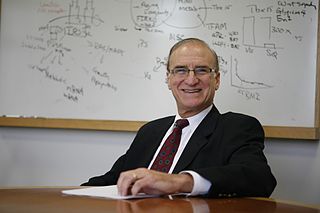
Carl Ronald Kahn is an American physician and scientist, best known for his work with insulin receptors and insulin resistance in diabetes and obesity. He is the Chief Academic Officer at Joslin Diabetes Center, the Mary K. Iacocca Professor of Medicine at Harvard Medical School and a member of the National Academy of Sciences since 1999.

The Campus Biotech is a Swiss institution hosting research institutes and biotechnology companies. The Campus Biotech is located in the former Merck Serono building, in Geneva (Switzerland).
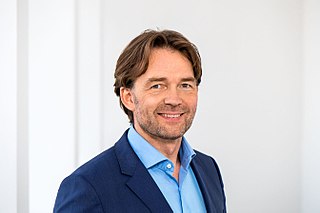
Matthias H. Tschöp is a German physician and scientist. He is the chief executive officer and scientific director of Helmholtz Zentrum München, German Research Center for Environmental Health. He is also Alexander von Humboldt Professor and chair of metabolic diseases at Technical University of Munich and serves as an adjunct professor at Yale University.
The Rice Center for Neuroengineering is an interdisciplinary research center, founded in 2014, housed within Rice University's Department of Electrical and Computer Engineering. The center is funded by an NSF IGERT grant, DARPA, the W.M. Keck Foundation, and Texas Instruments. Partner Institutions include Rice University, Baylor College of Medicine, the University of Texas Health Science Center, and the Gulf Coast Consortia. Facilities are located on the Rice University campus and in the Texas Medical Center.
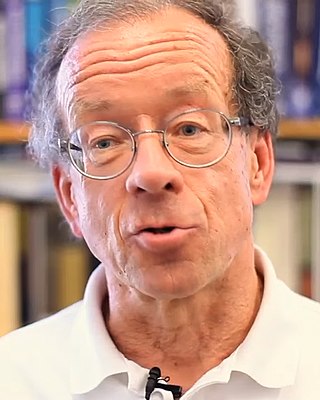
Arto V. Nurmikko, a native of Finland, is a L. Herbert Ballou University Professor of Engineering and Physics at Brown University. He received his degrees from University of California, Berkeley, with postdoctoral stays at MIT and Hebrew University. Professor Nurmikko conducts research in neuroengineering, brain sciences, nanophotonics and microelectronics, especially for the translation of device research to new technologies in biomedical, life science, and photonics applications.

Rafael Yuste is a Spanish-American neurobiologist and one of the initiators of the BRAIN Initiative announced in 2013. He is currently a professor at Columbia University.
Vasilis Ntziachristos is a Greek American biomedical engineer, scientist, and inventor best known for his development of fundamental and translational research tools for imaging tissues based on fluorescence and optoacoustics.

Grégoire Courtine is a French neuroscientist and a professor at the École Polytechnique Fédérale de Lausanne (EPFL), where he is the co-director of the Defitech center for interventional neurotherapies (.NeuroRestore). His research focuses on the field of neurotechnology, with the aim to restore locomotor functions in patients with central nervous system disorders such as spinal cord injuries.

Friedhelm Christoph Hummel is a German neuroscientist and neurologist. A full professor at École Polytechnique Fédérale de Lausanne, he is the Defitech Chair of Clinical Neuroengineering, and the head of the Hummel Laboratory at EPFL's School of Life Sciences. He also is an associate professor of clinical neuroscience at the University of Geneva.
The Wyss Institute for Biologically Inspired Engineering is a cross-disciplinary research institute at Harvard University focused on bridging the gap between academia and industry by drawing inspiration from nature's design principles to solve challenges in health care and the environment. It is focused on the field of biologically inspired engineering to be distinct from bioengineering and biomedical engineering. The institute also has a focus on applications, intellectual property generation, and commercialization. The Wyss Institute is located in Boston’s Longwood Medical Area and has 375 full-time staff. The Wyss is organized around eight focus areas, each of which integrate faculty, postdocs, fellows, and staff scientists. The focus areas are bioinspired therapeutics & diagnostics, diagnostics accelerator, immuno-materials, living cellular devices, molecular robotics, 3D organ engineering, predictive bioanalytics and synthetic biology.

Duygu Kuzum is a Turkish-American electrical engineer who is a professor at the University of California, San Diego. She develops transparent neural sensors based on single-layer materials. She was awarded a National Institutes of Health New Innovator Award.
